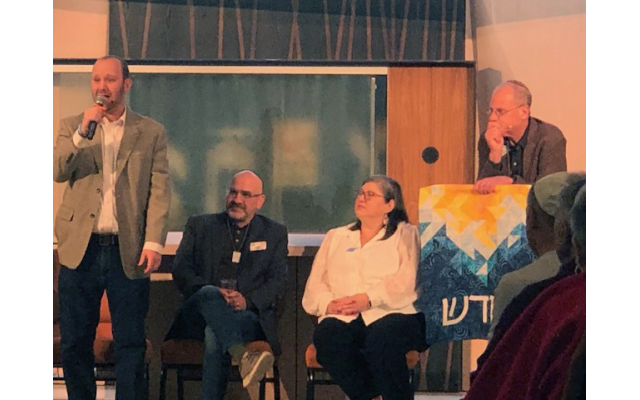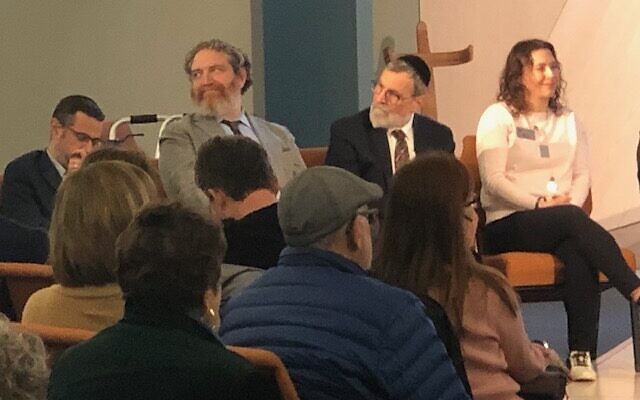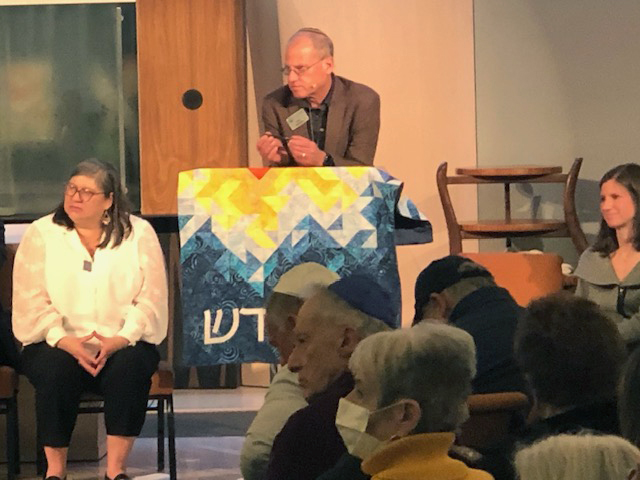Jewish Atlanta Leaders Reflect on Israel Trip
The week was "intense and important and meaningful," Eric Robbins, Federation president and CEO, said.
Dave Schechter is a veteran journalist whose career includes writing and producing reports from Israel and elsewhere in the Middle East.

Midway through a Feb. 18 forum with rabbis and communal leaders recently returned from a week in Israel, Rabbi Adam Starr of Congregation Ohr HaTorah said, “Take a moment and see what’s taking place here. We shouldn’t take this for granted.”
Starr appeared to be addressing both his fellow travelers and an audience of about 200 people at Congregation Or Hadash in Sandy Springs.
Seated alongside Starr, whose congregation is Modern Orthodox, were rabbis from Orthodox, Conservative, Reform, and Reconstructionist Judaism, and leaders from the Jewish Federation of Greater Atlanta, Anti-Defamation League, American Jewish Committee, and Jewish Community Relations Council of Atlanta.
Over an hour-and-a-half, they talked about what made this trip to Israel unique from previous visits, highlighting moments of significance, be it a place they visited, a scene they witnessed, or a conversation that moved them.
The rabbis acknowledged the diversity of opinion among them, as well as the diversity of the movements they represent.
Rabbi Binyomin Friedman of Congregation Ariel said that many years had passed since he took a similar, multi-denominational trip and he wanted to know “where other rabbis are at these days,” particularly after the Oct. 7 Hamas led terror attacks in Southern Israel and Israel’s subsequent military retaliation in Gaza.
Putting theological differences aside, “We walked away with a certain sense of knowing each other and learning about nice people,” Friedman said.
Eytan Davidson, regional director for the Anti-Defamation League, said that he was struck by “the vulnerability, the way we were able to share and support each other. It was truly special . . . a sense of Jewish peoplehood in a way that I’ve not really felt in my life.”
Echoing that, Rabbi Brad Levenberg of Temple Sinai praised a “vulnerability on the trip from each of us and a caring to receive that vulnerability with concern and compassion,” necessary when touring such sites as the burned and bullet-riddled homes at Kibbutz Kfar Aza, where more than 60 residents were murdered and 18 kidnapped on Oct. 7.
From his perspective, Rabbi Ilan Feldman of Congregation Beth Jacob found that two important aspects of the trip were “just being with the chevra [“society” in Hebrew] on the bus” and being present to show solidarity from the diaspora with Israelis.
Rabbi Lauren Henderson of Congregation Or Hadash the lone rabbi among the four women on the trip, said that the experience affirmed the need to promote and fund travel to Israel, for people of all ages. “Conversations are possible when your feet are on the ground that are not possible here . . . [where] it’s hard to get a real tangible sense of the situation,” she said.

Rabbi Mike Rothbaum of Congregation Bet Haverim highlighted voices he heard on the trip, including an Israeli who urged “Don’t let the voices of extremism dictate the terms of the debate.” The challenge, Rothbaum said, is “as a diaspora community, how can we support these voices.”
That prompted Feldman, whose shul is located just down Lavista Road from Bet Haverim, to say, “The last thing I expected myself to say is that I agree with Rabbi Mike.”
“He’s such a mensch,” Rothbaum replied, before two rabbis high-fived each other, to the amusement of their rabbinic colleagues and the audience.
The reaction to some of Rothbaum’s other comments was less unanimous.
Referring to the 1,200 (overwhelmingly Jewish) people killed on Oct. 7 — the most Jews killed in a single day since the Holocaust — and the 134 Israelis still held hostage in Gaza, Rothbaum said, “We still haven’t processed that grief.”
Turning to the death toll in Gaza, he said, “A Jewish state with a tallis on its flag has killed almost 30,000 people . . . Can we grieve those lives even if we think this [the war] is the right thing to do?”
A mixture of applause and boos followed Rothbaum’s statement that “We’ve got to call for an end to the occupation of the West Bank and Gaza.”
Rabbi Joshua Heller of Congregation B’nai Torah discussed “a very important Hebrew word: concepcia.” Oct. 7 laid waste to various “concepcia,” concepts on which conventional wisdom was based, he said.
“The people who busted out of Gaza thought, if we just fight hard enough we can make the Jews go away, and it turns out that concepcia was wrong” while on the Israeli side the idea that “If we just let enough supplies go through, they are not going to want anything more on their side of the fence, we can placate them, that concepcia was wrong,” he said, as was the belief that military assets could be shifted to the West Bank without endangering the kibbutzim and towns close to Gaza.
Rabbi Daniel Dorsch of Congregation Etz Chaim, who also is president of the Atlanta Rabbinical Association, had traveled Israel in November with other Conservative rabbis. “I wanted to see how Israel had changed from that first trip to the second,” said, comparing an “Israel in November totally in shock, looking down at the group, to an Israel that was beginning to look to the rainbow in the sky.
The families of the 134 Israelis held hostage are still searching for a rainbow.
Rabbi Peter Berg of The Temple said that he “left feeling that the hostages must be at the top of the agenda . . . a top, top, top urgent priority.”
To build support outside of the Jewish community, Berg said, “We have a responsibility to meet with leaders of different faiths and different faith traditions,” to translate the Jewish community’s concerns “into a language that other faith leaders will understand.”
“This is the hardest time to be a rabbi,” he concluded.

Several of the travelers singled out one moment as having been particularly emotional — visiting the Mount Herzl grave of Israel Defense Forces Staff Sgt. Rose Ida Lubin, a 20-year-old graduate of Dunwoody High School, who was serving with the border police when she was stabbed to death Nov. 6 in Old City precinct in Jerusalem.
“It was important to visit Rose Lubin’s gravesite. It was difficult and it was very beautiful,” Berg said. Visitors have left stones and other memorabilia, but part of her gravestone remains blank because the IDF has yet to give Israel’s current war a name.
Graveside prayers were led by Friedman, in whose congregation Lubin was a member. He had delivered a eulogy at her funeral on Mount Herzl less than three months earlier.
A short distance away, several thousand people were gathered for the funeral of an Israeli soldier, a man in his 20s. “All of us could hear the mother sobbing and people singing ‘Hatikvah,’” Israel’s national anthem, Berg said.
The experience at Lubin’s grave left Friedman “overwhelmed,” so he walked to the parking lot, where he observed people leaving the soldier’s funeral.
There, he saw “a weariness in their eyes and on their faces and you knew that they had done this yesterday or last week and they knew that they were going to be doing it again next week,” Friedman recounted. “It is Oct. 7 right now in Israel. The clock hasn’t been able to move ahead from that perspective.”
Whether it was ducking a rocket attack the day they arrived, painting a bomb shelter in Yokneam (a city in Northern Israel supported by Atlanta’s Federation), surveying the site of the Nova music festival massacre, having their bones rattled by the blast of an Israeli artillery shell, or conversations with Israelis across a range of political stripes, the week was “intense and important and meaningful,” Eric Robbins, Federation president and CEO, said.
- News
- Israel
- Dave Schechter
- rabbi adam starr
- Congregation Ohr HaTorah
- Congregation Or Hadash
- jewish federation of greater atlanta
- Anti-Defamation League
- American Jewish Committee
- Jewish Community Relations Council of Atlanta
- Rabbi Binyomin Friedman
- Congregation Ariel
- Eytan Davidson
- Rabbi Brad Levenberg
- Temple Sinai
- Rabbi Ilan Feldman
- Congregation Beth Jacob
- Rabbi Lauren Henderson
- Rabbi Mike Rothbaum
- Congregation Bet Haverim
- Rabbi Joshua Heller
- Congregation B'nai Torah
- Rabbi Daniel Dorsch
- congregation etz chaim
- Rabbi Peter Berg
- The Temple
- Rose Ida Lubin
- Eric Robbins



comments